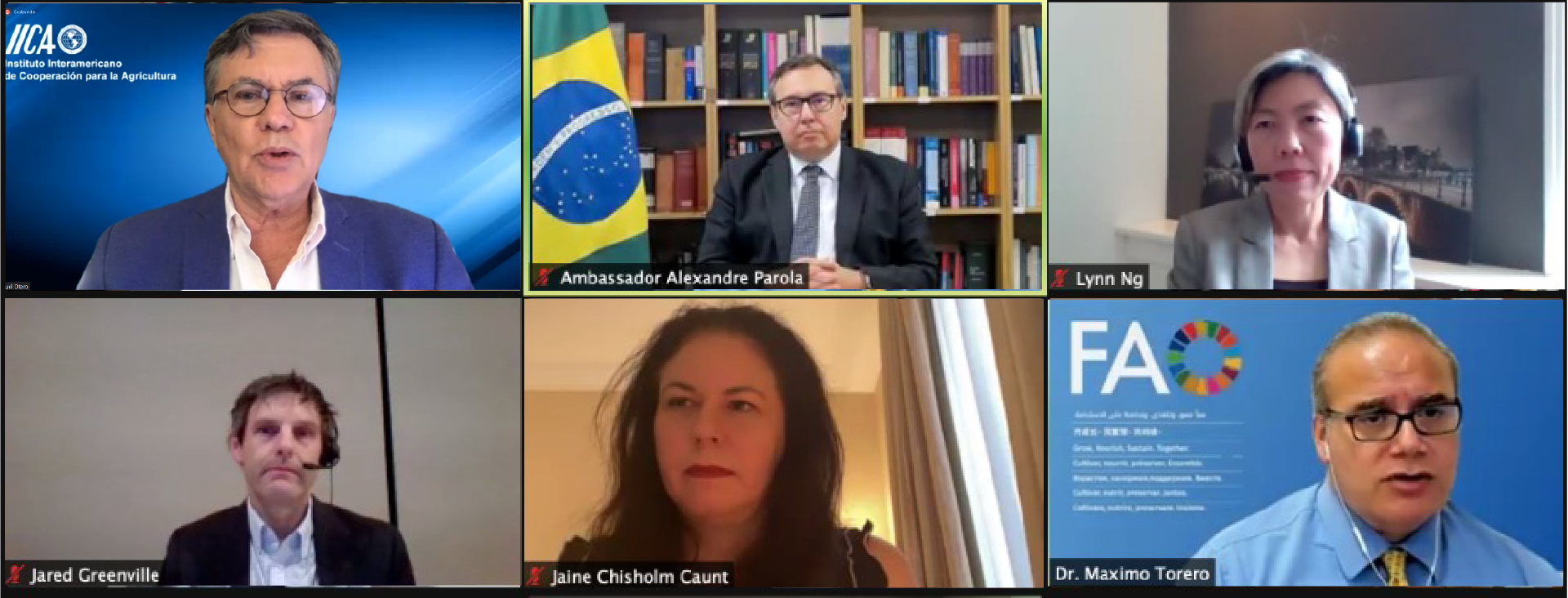IICA’s Director General argued that transparent international trade is essential in consolidating food and nutrition security; ensuring improved access to food at stable prices for the most vulnerable sectors; facilitating greater diversity of products and diets; and encouraging technology transfer.

Rome, 30 July 2021 (IICA) – Speaking at the UN Food Systems Pre-Summit in Rome, experts from various continents all agreed that international trade is key to global food security and the economic and social development of rural communities.
“The Contribution of International Agricultural Trade to Sustainable Food Systems” was the title of a panel discussion focusing on the need to do away with restrictions and distortions that inhibit the free flow of the food trade.
The presentations were part of the preparatory forum for the Food Systems Summit that is slated to take place in September at the United Nations’ Headquarters in New York.
Both global meetings were convened by Secretary-General, Antonio Guterres, in a bid to transform the way in which food is produced and consumed, as well as to accelerate measures to facilitate the achievement of the 17 Sustainable Development Goals.
The participants on the panel were: Ambassador Alexandre Parola, Brazil’s Permanent Representative to the World Trade Organization (WTO); Jaine Chisholm Caunt, Director General of the Grains and Feed Trade Association (GAFTA), a group that represents more than 1,800 companies that sell commodities in 98 countries; Jared Greenville, Executive Director of the Australian Bureau of Agricultural and Resource Economics and Sciences (ABARES); and Lynn Ng, Global Head of Commodities, Food and Agri at ING.
Manuel Otero, the Director General of the Inter-American Institute for Cooperation on Agriculture (IICA), gave the conclusions and closing remarks of the debate, whereas Máximo Torero, Assistant Director-General of the FAO opened the session.
The importance of free flowing international trade in eradicating hunger and extreme poverty was underscored by the speakers, who stressed the need to strengthen international cooperation to ensure the transparent trade of food products.
During the preparatory events for the Pre-Summit and the Summit, IICA maintained that the matter of international trade had not been given sufficient recognition in the agenda of the global forums.
The Latin American and Caribbean region is the largest net food exporter—responsible for 14% of international trade—and thanks to this, it stands to play a pivotal role in achieving global food security.
During the panel discussion, the Director General of IICA emphasized the need for trade-related topics to be given their due relevance at the Summit, with the understanding that trade flows must be seen as the shortest path to connect production with consumption.
Removing the export subsidies and non-tariff barriers that distort the international food market are key, both to ensure that vulnerable populations around the globe have access to food and to ensure the profitability and welfare of rural communities.
“International trade is an essential part of food systems as it connects them and, as such, makes them more economically efficient”, said Otero.
“Because of trade, we are able to consolidate food and nutrition security; ensure improved access to food at stable prices for the most vulnerable sectors; facilitate greater diversity of products and diets; and encourage technology transfer”.
The Director General of IICA underscored the need to modernize and reinforce the multilateral system and to promote national and international policies that would create the conditions for more free-flowing and transparent trade.
To that end, Otero advocated for trade liberalization and efforts to ensure that any sanitary and phytosanitary regulations are scientifically based. He placed special emphasis on the importance of ensuring that any sustainability requirements do not become new non-tariff barriers and recognizing that there are different paths to achieve the same objective.
IICA coordinated a lengthy debate process between its 34 Member States that resulted in a unified position of the Americas ahead of the global forums on transforming food systems. The countries of the Americas agreed to underpin the essential role of agriculture in eradicating poverty, promoting rural development and improving environmental conservation.
The hemisphere’s vision is revealed in a document with 16 key messages, the fourth of which refers to trade: “Open, transparent and predictable international trade is essential for an efficient global food system and should be governed by multilateral rules and standards, with a view to promoting agricultural trade liberalization and a reduction in tariff and non-tariff restrictions. The multilateral system should play an increasingly active role in limiting and reducing measures which distort trade and production and ensure the adoption and application of science-based sanitary and phytosanitary measures”.
“From the perspective of the ministers of Agriculture of the Western Hemisphere, trade is not just important, it is vital for the sustainability of agriculture in its three dimensions: social, environmental and economic”, summed up Otero.
“We must improve and modernize our trade system for the 21st century; but if the Summit proposes working to reinforce it, it must ensure that all decisions are based on science and that they work together for the nations to continue sharing the wealth of agricultural production with a world that needs more and more food”.
More information:
Institutional Communication Division
comunicacion.institucional@iica.int











